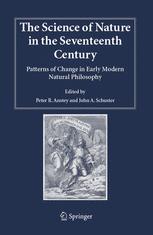

Most ebook files are in PDF format, so you can easily read them using various software such as Foxit Reader or directly on the Google Chrome browser.
Some ebook files are released by publishers in other formats such as .awz, .mobi, .epub, .fb2, etc. You may need to install specific software to read these formats on mobile/PC, such as Calibre.
Please read the tutorial at this link: https://ebookbell.com/faq
We offer FREE conversion to the popular formats you request; however, this may take some time. Therefore, right after payment, please email us, and we will try to provide the service as quickly as possible.
For some exceptional file formats or broken links (if any), please refrain from opening any disputes. Instead, email us first, and we will try to assist within a maximum of 6 hours.
EbookBell Team

5.0
80 reviewsThe seventeenth century marked a critical phase in the emergence of modern science. But we misunderstand this process, if we assume that seventeenth-century modes of natural inquiry were identical to the highly specialised, professionalised and ever proliferating family of modern sciences practised today.
In early modern Europe the central category for the study of nature was ‘natural philosophy’, or as Robert Hooke called it in his Micrographia, the Science of Nature. In this discipline general theories of matter, cause, cosmology and method were devised, debated and positioned in relation to superior disciplines, such as theology; cognate disciplines, such as mathematics and ethics; and subordinate disciplines, such as the ‘mixed mathematical sciences’ of astronomy, optics and mechanics.
Thus, the ‘Scientific Revolution’ of the Seventeenth Century did not witness the sudden birth of ‘modern science’ but rather conflict and change in the field of natural philosophy: Aristotelian natural philosophy was challenged and displaced, as thinkers competed to redefine natural philosophy and its relations to the superior, cognate and subordinate disciplines. From this process the more modern looking disciplines of natural science emerged, and the idea of a general Science of Nature suffered a slow demise.
The papers in this collection focus on patterns of change in natural philosophy in the seventeenth century, aiming to encourage the use and articulation of this category in the historiography of science. The volume is intended for scholars and advanced students of early modern history of science, history of philosophy and intellectual history. Philosophers of science and sociologists of scientific knowledge concerned with historical issues will also find the volume of relevance. Above all, the volume is addressed to anyone interested in current debates about the origin and nature of modern science.